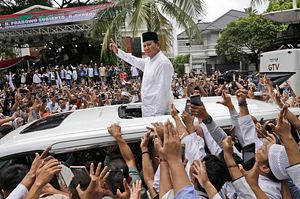The court challenge to Indonesia’s presidential election from the losing candidate claims that the police, intelligence agency, and other state institutions were biased in favor of the incumbent, but its evidence for “massive” fraud is mainly printouts of news articles.
Former General Prabowo Subianto has refused to accept the results of the April 17 election and instead declared himself the winner. Seven people died in what police say was orchestrated rioting in the capital last week after official election results confirmed President Joko “Jokowi” Widodo had won a second term with 55.5 percent of the vote.
Subianto’s legal challenge filed with the Constitutional Court on Friday, and reviewed by The Associated Press, alleges there was “structured, systematic, and massive” fraud before, during, and after the election in the world’s third-largest democracy.
It repeats earlier assertions from the Subianto campaign that there were 17.5 million duplicated names on the voter list, a claim disputed by the independent Election Commission. The petitioners want the court to invalidate the election, declare that Jokowi committed election fraud, and install Subianto as president. The court has to rule by June 28.
The divisive election campaign highlighted Muslim-majority Indonesia’s religious divides. Subianto, who allied himself with groups that want Islamic law to replace secular government, won heavily in conservative provinces but was defeated nationally by Jokowi’s coalition of moderate and minority voters. It was Subianto’s second loss to Jokowi and his fourth unsuccessful bid for the presidency.
Constitutional law expert Refly Harun said lawyers for Subianto need to prove all their allegations and also show that they collectively amounted to massive electoral fraud.
“If only reading their lawsuit documents, it’s not strong enough. Because in their petition they only included evidence from news links, that could not stand alone,” Harun said.
“But we should learn the degree of their evidence in the hearing. And it’s not easy to convince the nine judges at the Constitutional Court,” he said.
Subianto had also challenged Jokowi’s victory after the last presidential election in 2014, claiming “structured, systemic and massive” voting irregularities then as well. The 2014 appeal was rejected in a unanimous verdict by the Constitutional Court.
Citing a subsequently withdrawn statement from a former district police chief, the legal challenge says local police chiefs were ordered to boost support for Jokowi. Further evidence of police bias will be presented during the court hearings, according to the legal documents.
To back up its claim of a biased national intelligence agency, the legal case cites a June 2018 statement from former President Susilo Bambang Yudhoyono that some individuals in that agency and other security institutions were not neutral.
The complaint also alleges that government spending programs and increases to them were ploys by the Jokowi campaign to buy votes using the state budget.
Several dozen news articles from online sites of varying credibility are provided as evidence of massive election fraud, with headlines such as “Jokowi Gets Support When Attending the Village Chiefs National Gathering” and “Jokowi Admits Infrastructure Development in the Interest of the 2019 Election.”
Votes in Indonesia’s elections are counted publicly at hundreds of thousands of polling places, which are each limited to 300 voters. The vote tabulation forms from each polling place are available online and can be cross referenced against the results collated by the Election Commission.
Before the election, there were allegations of irregularities in the overseas vote after thousands of already marked voting papers were discovered in two locations in neighboring Malaysia.
By Stephen Wright and Niniek Karmini for The Associated Press.

































